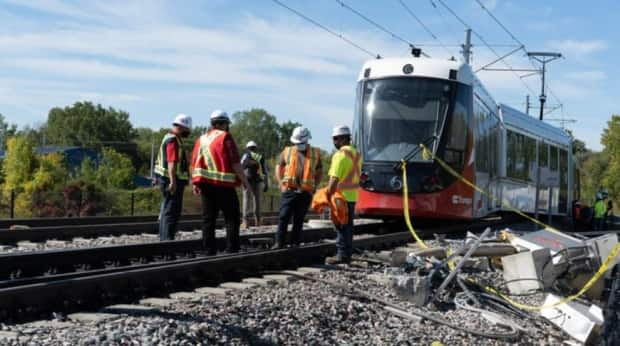City council won't debate whether to hold emergency LRT meetings

Three days after an Ottawa light rail train went off the tracks, shutting down the Confederation Line indefinitely, city council avoided a debate over whether to hold emergency meetings to discuss the system's "serious malfunctions."
Sunday's derailment was the second in six weeks, and had been discussed at length on Monday at transit commission. Then Tuesday, the Transportation Safety Board of Canada (TSB) stated the train had derailed earlier than previously discussed and travelled across a bridge in its derailed state.
At city council on Wednesday, Kitchissippi ward Coun. Jeff Leiper called for biweekly meetings of the transit commission until the train line is running again, as well as an emergency meeting of all council members before the end of the week.
What Leiper didn't do before moving this motion, was give a heads up to transit commission chair Coun. Allan Hubley, displeasing Ottawa Mayor Jim Watson who urged his colleagues to vote the motion down.
The motion needed 18 votes, or ¾ of city councillors, but only 16 voted to suspend procedural rules to at least discuss Leiper's motion, instead of waiting for their next meeting three weeks away.
Six councillors sided with Watson, who later explained the municipality's committee schedule already sees several meetings per week, and he called Leiper's motion for more meetings "political theatre."
"I don't support never-ending meetings," Watson told reporters. "Our staff need to spend their scarce time resources on fixing the problem."
WATCH | Mayor Watson on voting down Leiper motion:
Judicial inquiry, cancelling contract
The stage is set, however, for larger discussions on the city's light rail system in October.
The mayor said the finance and economic development committee would receive a private briefing at its next meeting Oct. 5 to go over legal options related to its contract with Rideau Transit Group (RTG) and its maintenance arm, Rideau Transit Maintenance (RTM).
The maintenance arm is in default on its contract and the city's lawyers have a British firm examining how that happened.
Meanwhile, three councillors signalled they will have motions to debate on Oct. 13.
Coun. Catherine McKenney wants council to formally request a judge conduct a public inquiry of Ottawa's LRT, dating back to 2012 when the contract for Stage 1 was approved, and looking into how city council delegated authority to city staff.
The Somerset ward councillor pointed out a municipality is allowed to request an inquiry under provincial laws in order to investigate supposed breach of trust by a council member, employee or contractor.
Coun. Diane Deans, meanwhile, wants staff to look at cancelling the 30-year maintenance contract, an idea raised during the train's problem-plagued first year of operation.
Transit chair Hubley and the mayor will also seek free transit during the month of December at the next council meeting.
'Alstom, Alstom, Alstom'
Ottawa's outgoing transportation manager said it is not yet definitive where the train first derailed on Sunday, even though TSB investigators said it happened before Tremblay Station.
John Manconi, who retires next week after a three-decade municipal career, also maintained "everything is fixable."
"I'll leave with one word. It's 'Alstom, Alstom, Alstom,'" said Manconi, referring to the light rail subcontractor.
"They need to step up and get into Ottawa with an army of engineers."
The mayor intends to meet with executives from the groups that have built and maintained the city's light rail system in the coming days to relay the message Ottawans aren't pleased with the level of service.
Watson pointed out Ottawa's LRT operated reliably for many months, but now the city needs to regain people's confidence.
"When I'm on the system and it's working, it's a really great system," said Watson. "But we can't call it great when you have these serious malfunctions."

